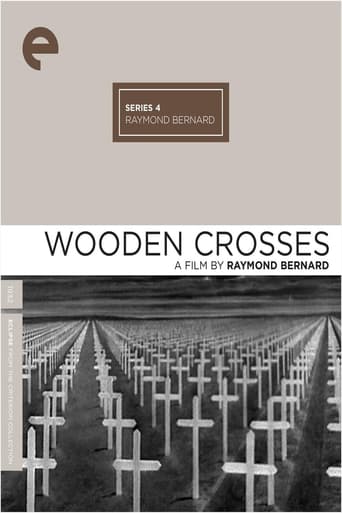clanciai
What makes this film so impressive is its sinister direction, always kept at a calm distance but firm control by Raymond Bernard in visualizing a hell on earth worse than any hell imaginable, as it gives an all too convincing impression of never ending. The central battle scene in the middle of the film gives its definite stamp of a relentlessly realistic documentary in which category it outshines almost all the other first world war films including "All Quiet on the Western Front" (more personal), Rex Ingram's "The Four Horsemen of the Apocalypse" (more sentimental), Stanley Kubrick's "Paths of Glory" (more theatrical) Renoir's "The Grand Illusion" (more romantic) and "Oh What a Lovely War!" (musical). Not just the long great battle scene, but many scenes give the impression of going on forever, as they are so implacably sustained resulting in an overwhelming impact, like the dying corporal scene with Charles Vanel, who continued a long distinguished career in films with above Henri-Georges Clouzot in the 50s, and his death scene here is only a prelude to what follows - one can understand the veteran from that war who in 1962. when seeing the film on TV, committed suicide afterwards. It's all about ordinary men, good faithful soldiers, who keep on cheering and making the best of it as if the reality of the timeless horror was just something to accept as the ordinary, their natural cheerful moods and the irony of the absurd military self-deceit accentuating the superior quality of this film as the most realistic of first world war films.
runamokprods
Terrific dark anti-war WWI film, light years ahead of it's time stylistically, with battle scenes that rival (and clearly inspired) Kubrick's great 'Paths of Glory'. More cynical, cutting, and real than 'All Quiet on the Western Front'. The film focuses on the various members of a battalion who are basically canon fodder. There's no real lead, just an observation of these slowly hardening men, as a group, and no real plot, just a series of episodes. Not every episode is as strong as the other, but enough are so powerful they make this a special and important film, amazingly directed for its time.
zetes
Amazingly well directed and produced WWI flick made in France. Bernard is an extremely talented director. Unfortunately, the film doesn't stand up too well compared to so many other WWI pictures, notably the earlier All Quiet on the Western Front and the later The Grand Illusion. What Wooden Crosses lacks is strong characters. About the only one who stands out from the rest is the "loudmouth", as he is described bluntly by another solider. "There's one in every company," he says; or at least, I think he says that. If no one said that, someone probably should have. Instead, Bernard concentrates almost wholly on extremely long battle sequences. One lasts nearly 40 minutes. Great, but if I don't care about the characters, I'm not going to care much when one gets killed.
dbborroughs
Based on a biographical novel concerning life during WW1 this is included in the Raymond Bernard Box set from Eclipse (ie. Criterion). Made in 1932 the film seems to have been made years later. The technical aspects of the film are astounding. a blending of silent and sound techniques with images that foreshadow the Hollywood films of the 1940's, the war documentaries of the second world war not to mention modern films such as Saving Private Ryan and the Thin Red Line this film for the most part doesn't feel 75 years old.The plot follows a company of men from enlistment to the end. After a slow start where the film introduces everyone and we get a feel for the characters the movie moves to the trenches and battle where we are placed into harms way with the men we have been introduced to. What follows are essentially a series of set pieces that move the men further and further in to war's nightmare. There is a sequence where the men wait in the trenches and in one bunker in particular, where they can hear the German tunneling below them to place charges which will, when detonated blow them to kingdom come. Its an unnerving sequence since the men know whats coming but are unable to do anything about it- except hope that their rotation comes before the bombs go off. The centerpiece of the film is an never ending attack, on ward and onward and onward. How could anyone do such a thing? As a title card say the attack lasted for ten days. I was exhausted by the sequence and it lasted only for twenty or so minutes. Its an amazing piece of film making.If there is a flaw in the film its that the dialog sequences seem more Hollywood convention (if you'll allow me to say about a film made in France). The group of men are your standard bunch and they all seem to get lost. Not that it ruins the film, it doesn't, it just keeps the film from having that complete emotional connection.Rightly considered a classic film, this is must viewing for anyone who loves the cinema.


